Abstract
Serum from 491 patients with cancer and from 151 patients of comparable age without recognized cancer was tested by indirect immunofluorescence for antibodies to ovarian antigens. Circulating antibody to the cytoplasm of rabbit ova was found in from 19 to 47% of patients with cancer of the ovary, endometrium, kidney, bladder or testis, or with lymphoma, and in only 3-3% of control patients. Antibodies to thecacell antigens were not more common in patients with cancer than in other patients, but within the group of cancer patients, such antibodies were, in all but one case, associated with cancer of the genito-urinary tract or with lymphoma. The anti-theca-cell antibodies observed produced a staining pattern indistinguishable from that obtained with the serum of patients with Addison's disease but were not, in the cancer patients, associated with antibodies to adrenal tissue. Tests for antibody to the cytoplasm of ova were more frequently positive in patients with progressive cancers than in patients successfully treated by surgery or radiation, and were seen in patients in whom cancer had recurred following removal of the organ of origin. These findings suggest that the antigen or antigens that evoke antibody to the cytoplasm of ova arise from tumour cells rather than from damage to normal tissue by surgery, tumour invasion or radiation.
Full text
PDF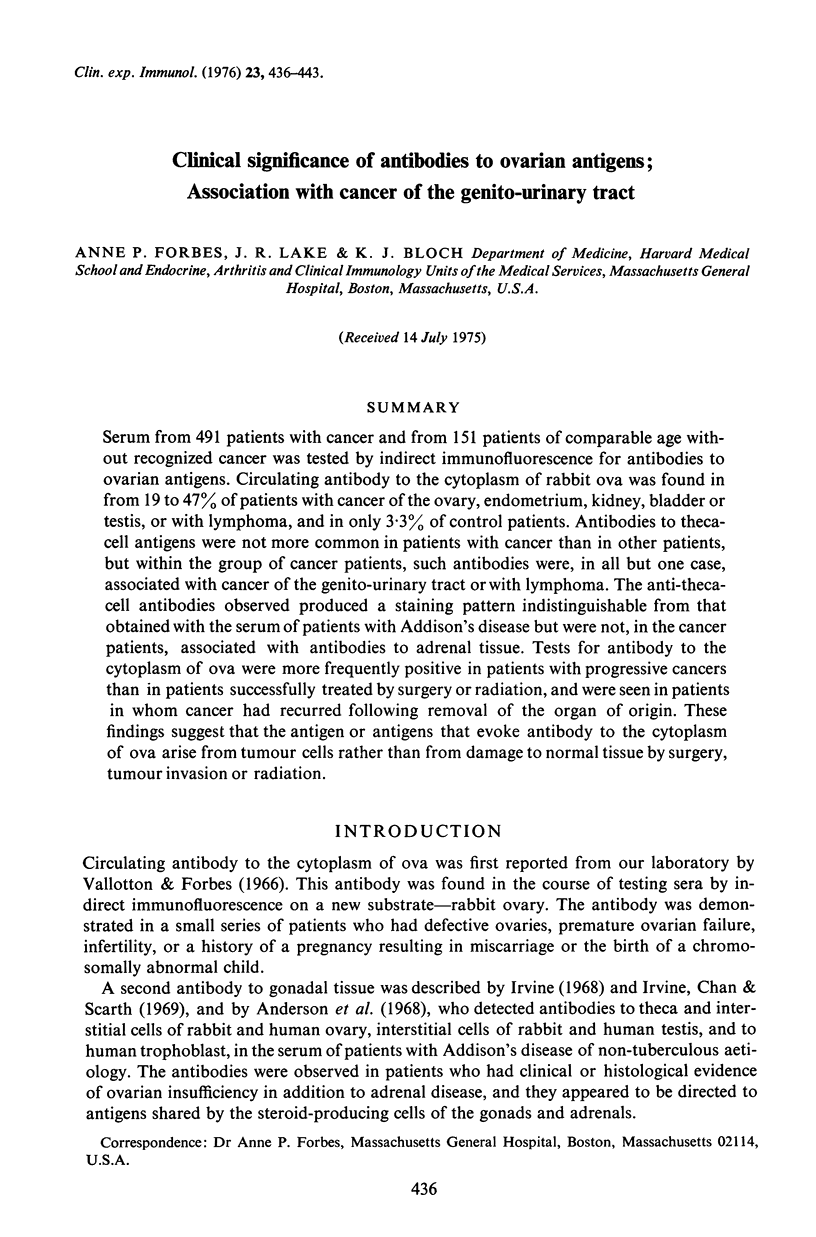
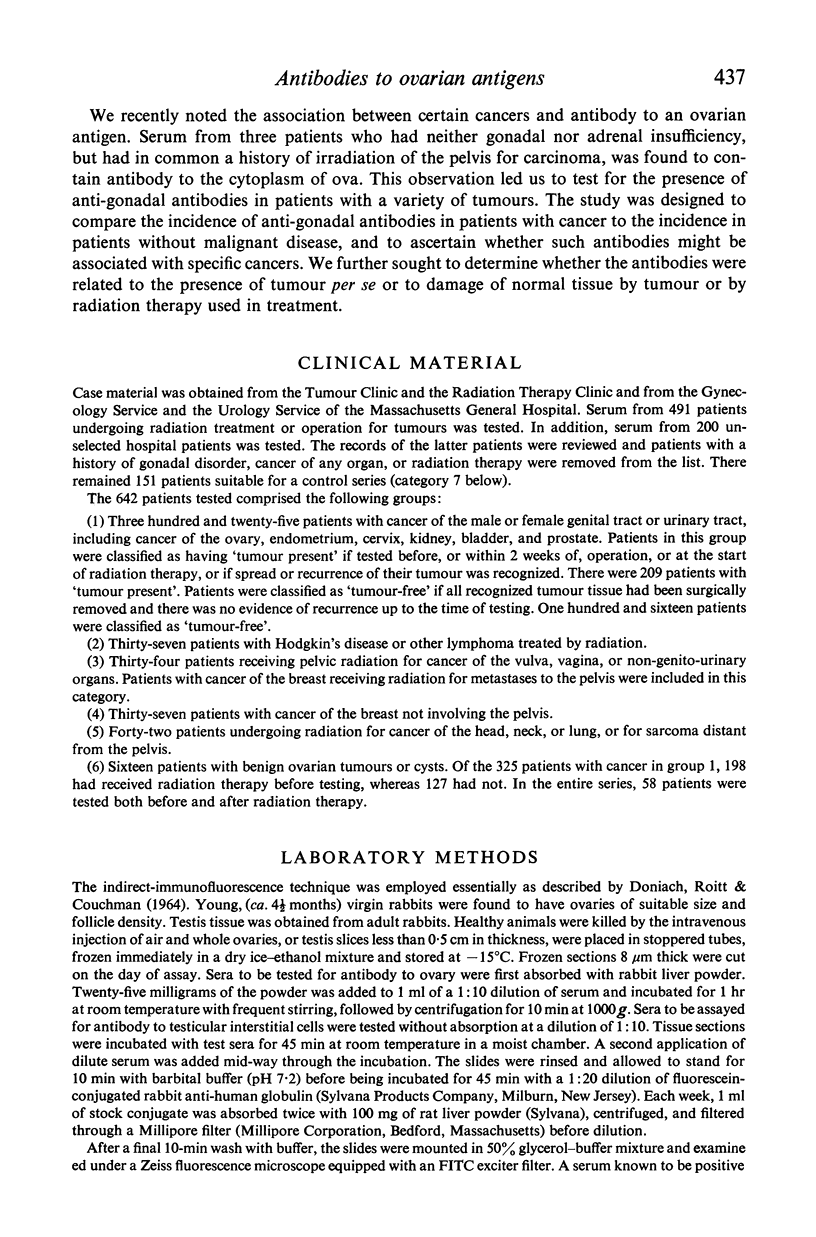
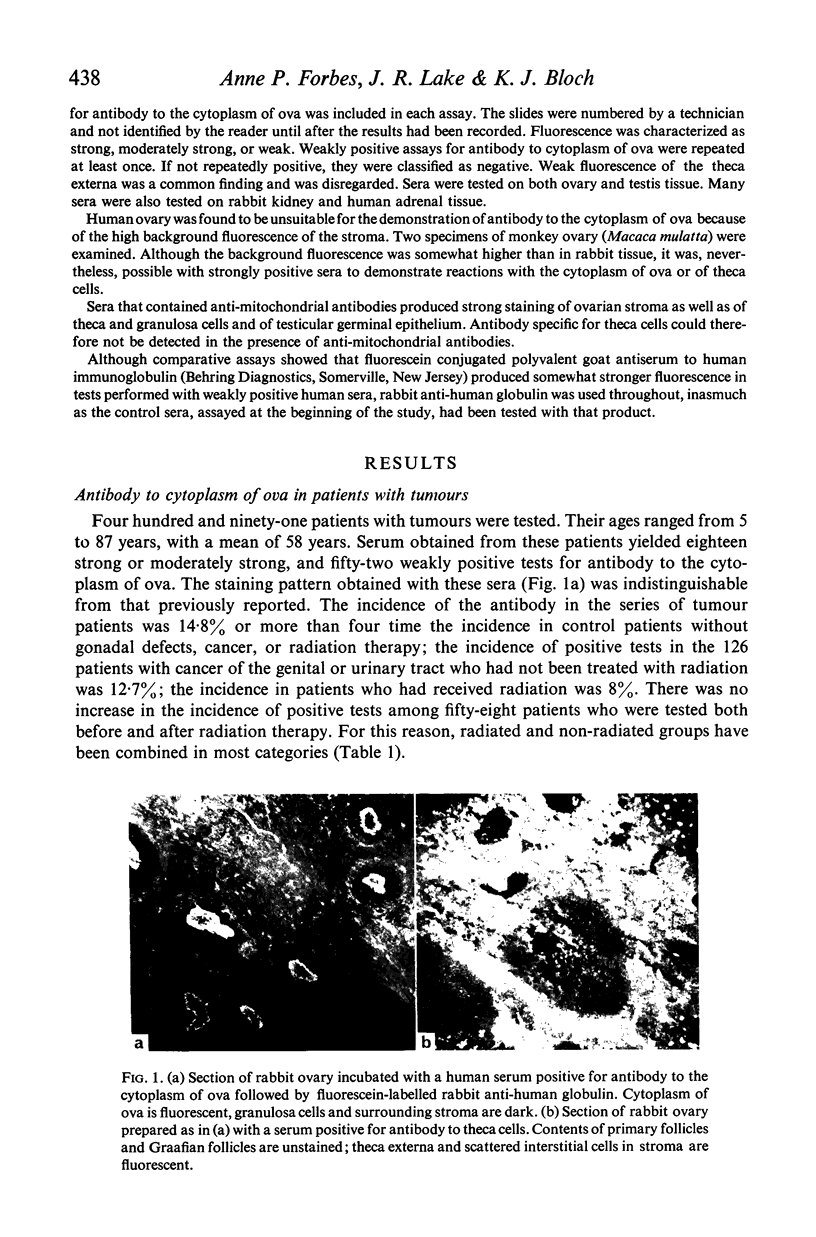

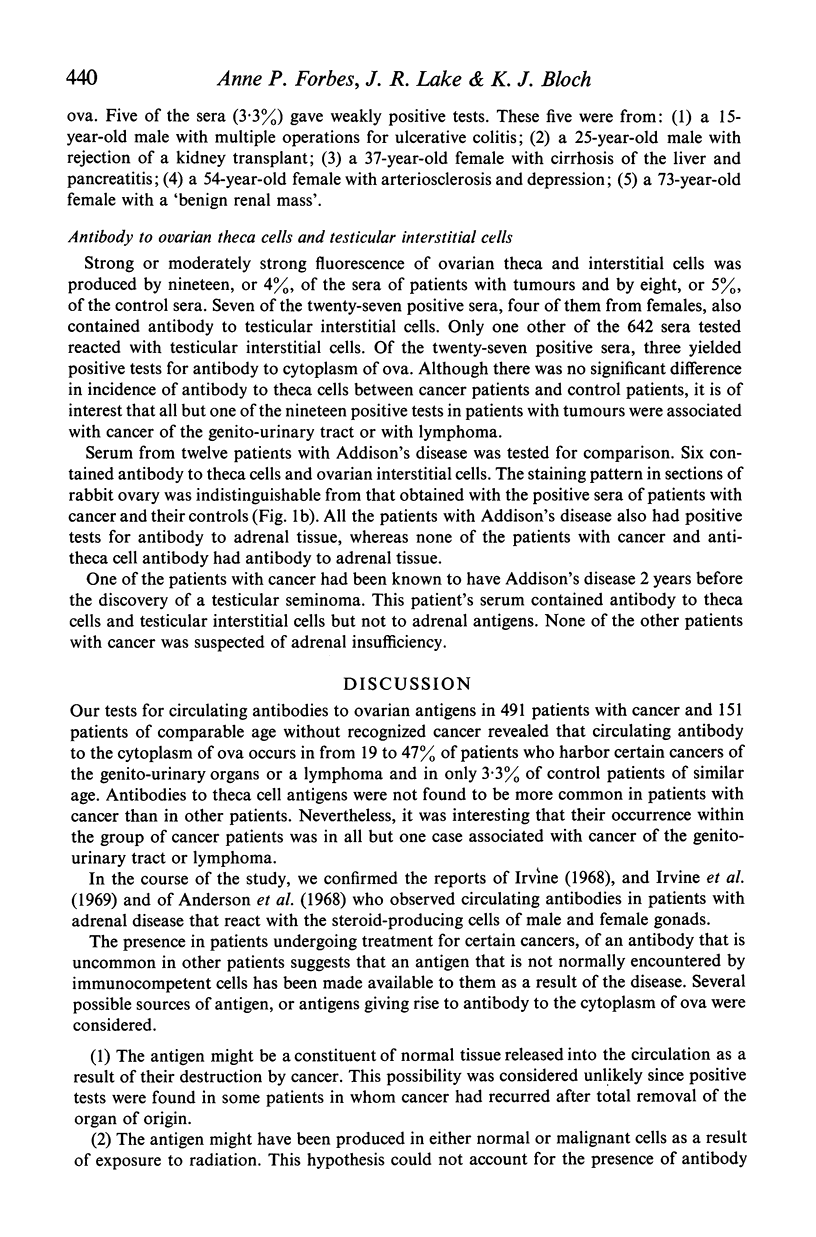
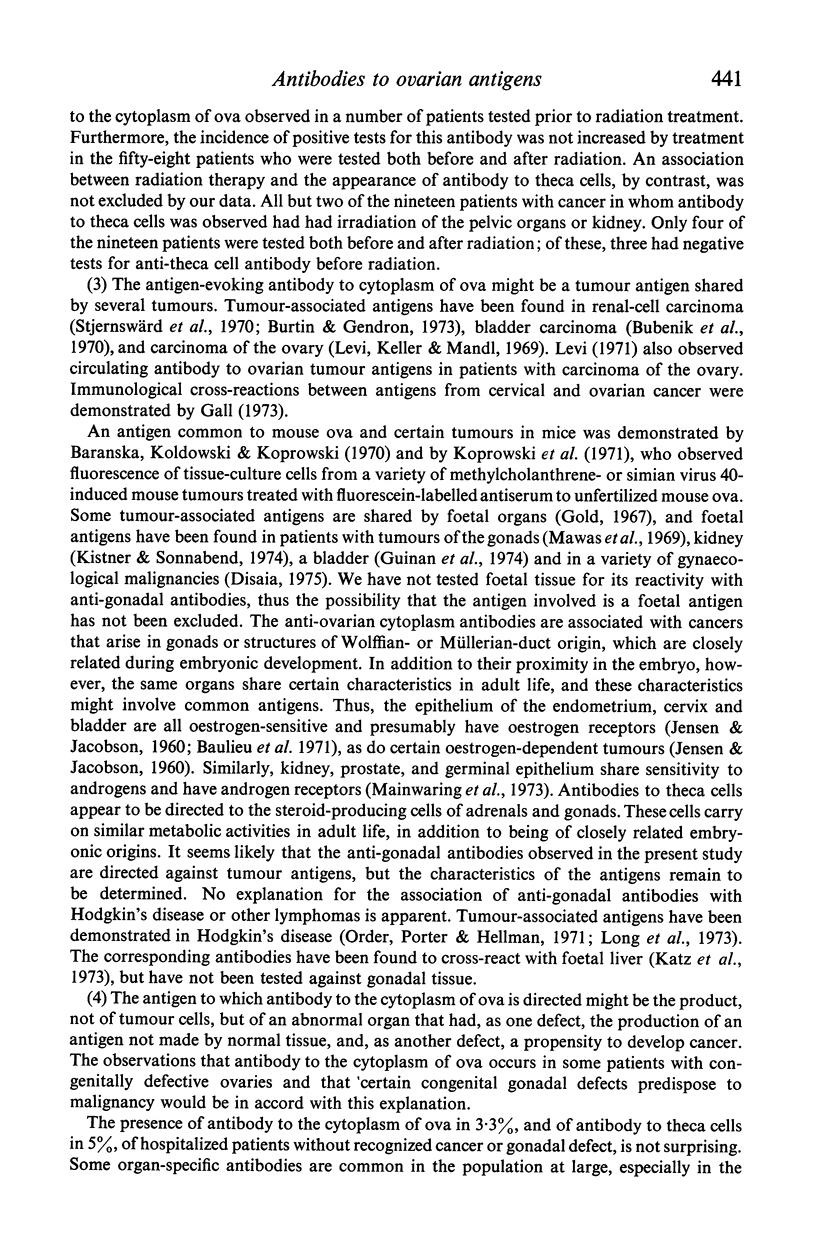

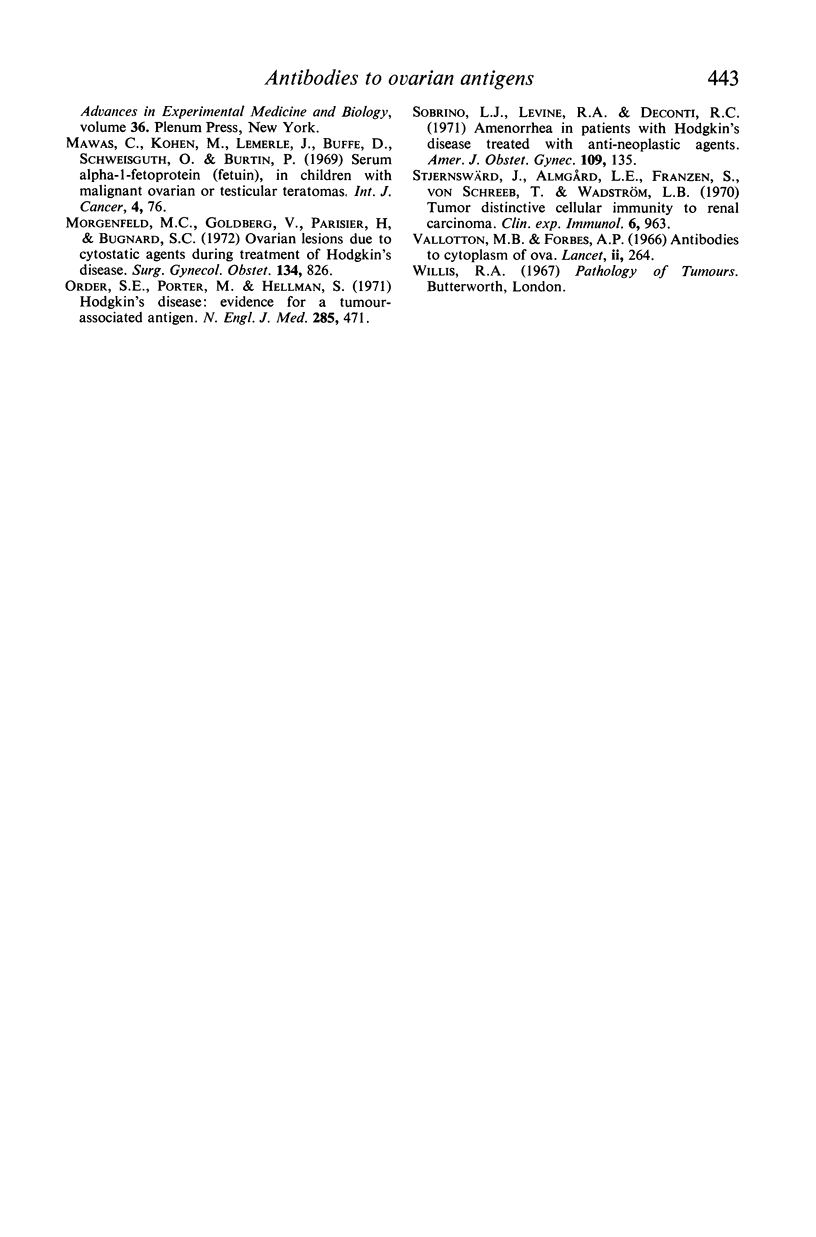
Selected References
These references are in PubMed. This may not be the complete list of references from this article.
- Anderson J. R., Goudie R. B., Gray K., Stuart-Smith D. A. Immunological features of idiopathic Addison's disease: an antibody to cells producing steroid hormones. Clin Exp Immunol. 1968 Feb;3(2):107–117. [PMC free article] [PubMed] [Google Scholar]
- Baranska W., Koldovsky P., Koprowski H. Antigenic study of unfertilized mouse eggs: cross reactivity with SV40-induced antigens. Proc Natl Acad Sci U S A. 1970 Sep;67(1):193–199. doi: 10.1073/pnas.67.1.193. [DOI] [PMC free article] [PubMed] [Google Scholar]
- Baulieu E. E., Alberga A., Jung I., Lebeau M. C., Mercier-Bodard C., Milgrom E., Raynaud J. P., Raynaud-Jammet C., Rochefort H., Truong H. Metabolism and protein binding of sex steroids in target organs: an approach to the mechanism of hormone action. Recent Prog Horm Res. 1971;27:351–419. doi: 10.1016/b978-0-12-571127-2.50033-x. [DOI] [PubMed] [Google Scholar]
- Bubeník J., Perlmann P., Helmstein K., Moberger G. Cellular and humoral immune responses to human urinary bladder carcinomas. Int J Cancer. 1970 May 15;5(3):310–319. doi: 10.1002/ijc.2910050303. [DOI] [PubMed] [Google Scholar]
- Burtin P., Gendron M. C. A tumor-associated antigen in human nephroblastomas. Proc Natl Acad Sci U S A. 1973 Jul;70(7):2051–2054. doi: 10.1073/pnas.70.7.2051. [DOI] [PMC free article] [PubMed] [Google Scholar]
- DiSaia P. J., Haverback B. J., Dyce B. J., Morrow C. P. Carcinoembryonic antigen in patients with gynecologic malignancies. Am J Obstet Gynecol. 1975 Jan 15;121(2):159–163. doi: 10.1016/0002-9378(75)90631-6. [DOI] [PubMed] [Google Scholar]
- Diaz-Jauanen E., Strickland R. G., Williams R. C. Studies of human lymphocytes in the newborn and the aged. Am J Med. 1975 May;58(5):620–628. doi: 10.1016/0002-9343(75)90497-0. [DOI] [PubMed] [Google Scholar]
- Gall S. A., Walling J., Pearl J. Demonstration of tumor-associated antigens in human gynecologic malignancies. Am J Obstet Gynecol. 1973 Feb 1;115(3):387–393. doi: 10.1016/0002-9378(73)90595-4. [DOI] [PubMed] [Google Scholar]
- Guinan P., Ablin R. J., Sadoughi N., Bush I. M. Carcinoembryonic-like antigen in the urine of patients with carcinoma of the bladder and normal controls. J Surg Oncol. 1974;6(2):127–131. doi: 10.1002/jso.2930060207. [DOI] [PubMed] [Google Scholar]
- HILL O. W. Thyroglobulin antibodies in 1,297 patients without thyroid disease. Br Med J. 1961 Jun 24;1(5242):1793–1796. doi: 10.1136/bmj.1.5242.1793. [DOI] [PMC free article] [PubMed] [Google Scholar]
- Irvine W. J., Chan M. M., Scarth L., Kolb F. O., Hartog M., Bayliss R. I., Drury M. I. Immunological aspects of premature ovarian failure associated with idiopathic Addison's disease. Lancet. 1968 Oct 26;2(7574):883–887. doi: 10.1016/s0140-6736(68)91053-2. [DOI] [PubMed] [Google Scholar]
- Irvine W. J., Chan M. M., Scarth L. The further characterization of autoantibodies reactive with extra-adrenal steroid-producing cells in patients with adrenal disorders. Clin Exp Immunol. 1969 May;4(5):489–503. [PMC free article] [PubMed] [Google Scholar]
- Katz D. H., Order S. E., Graves M., Benacerraf B. Purification of Hodgkin's disease tumor-associated antigens. Proc Natl Acad Sci U S A. 1973 Feb;70(2):396–400. doi: 10.1073/pnas.70.2.396. [DOI] [PMC free article] [PubMed] [Google Scholar]
- Kistler G. S., Sonnabend W. Antikörper gegen ein fetorenales Antigen in Hepatitis-B-Patienten, Trägern von Nierentumoren und gesunden Individuen. Schweiz Med Wochenschr. 1974 Apr 6;104(14):485–497. [PubMed] [Google Scholar]
- Levi M. M. Antigenicity of ovarian and cervical malignancies with a view toward possible immunodiagnosis. Am J Obstet Gynecol. 1971 Mar 1;109(5):689–698. doi: 10.1016/0002-9378(71)90754-x. [DOI] [PubMed] [Google Scholar]
- Levi M. M., Keller S., Mandl I. Antigenicity of a papillary serous cystadenocarcinoma tissue homogenate and its fractions. Am J Obstet Gynecol. 1969 Nov 15;105(6):856–861. doi: 10.1016/0002-9378(69)90091-x. [DOI] [PubMed] [Google Scholar]
- Long J. C., Aisenberg A. C., Zamecnik M. V., Zamecnik P. C. A tumor antigen in tissue cultures derived from patients with Hodgkin's disease. Proc Natl Acad Sci U S A. 1973 May;70(5):1540–1544. doi: 10.1073/pnas.70.5.1540. [DOI] [PMC free article] [PubMed] [Google Scholar]
- Mawas C., Kohen M., Lemerle J., Buffe D., Schweisguth O., Burtin P. Serum alpha-1 foeto-protein (fetuin) in children with malignant ovarian or testicular teratomas. Preliminary results. Int J Cancer. 1969 Jan 15;4(1):76–79. doi: 10.1002/ijc.2910040110. [DOI] [PubMed] [Google Scholar]
- Morgenfeld M. C., Goldberg V., Parisier H., Bugnard S. C., Bur G. E. Ovarian lesions due to cytostatic agents during the treatment of Hodgkin's disease. Surg Gynecol Obstet. 1972 May;134(5):826–828. [PubMed] [Google Scholar]
- Order S. E., Porter M., Hellman S. Hodgkin's disease: evidence for a tumor-associated antigen. N Engl J Med. 1971 Aug 26;285(9):471–474. doi: 10.1056/NEJM197108262850901. [DOI] [PubMed] [Google Scholar]
- Sobrinho L. G., Levine R. A., DeConti R. C. Amenorrhea in patients with Hodgkin's disease treated with antineoplastic agents. Am J Obstet Gynecol. 1971 Jan 1;109(1):135–139. doi: 10.1016/0002-9378(71)90848-9. [DOI] [PubMed] [Google Scholar]
- Stjernswärd J., Almgård L. E., Franzén S., von Schreeb T., Wadström L. B. Tumour-distinctive cellular immunity to renal carcinoma. Clin Exp Immunol. 1970 Jun;6(6):963–968. [PMC free article] [PubMed] [Google Scholar]
- Vallotton M. B., Forbes A. P. Antibodies to cytoplasm of ova. Lancet. 1966 Jul 30;2(7457):264–265. doi: 10.1016/s0140-6736(66)92546-3. [DOI] [PubMed] [Google Scholar]


